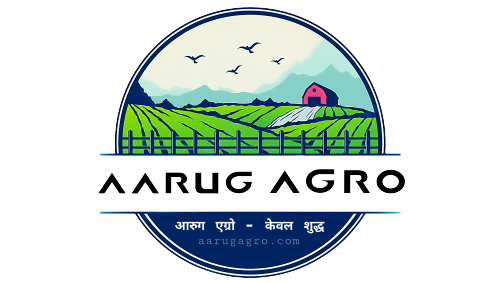Sheep Farming in Nigeria: Sheep farming has a long tradition in Nigeria. Nigeria’s economy continues to be significantly influenced by sheep herding today. Small-scale farmers have numerous opportunities to enter this business and make a good living. Sheep are suitable for small-scale farming operations because they require little maintenance and little room.
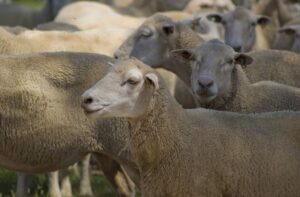
How to start sheep farming in Nigeria
Why start a sheep farming business in Nigeria?
Raising sheep for meat or wool output is known as sheep farming in Nigeria. It entails choosing an appropriate spot for the farm, preparing the land, giving the sheep a place to live and eat, as well as ensuring their wellbeing. Starting a sheep farming enterprise in Nigeria makes sense for a variety of factors. First off, sheep farming thrives in the environment. Sheep don’t need additional shelter or weather protection because the average temperature is warm enough.
Second, Nigerian consumers have a high desire for sheep meat. Sheep meat is frequently offered during special occasions and celebrations in Nigeria because it is prized by many as a delicacy. Third, compared to other livestock enterprises, starting a sheep farm takes comparatively little capital. Fourth, there are many small-scale farmers in Nigeria who are experienced in caring for and managing livestock. For a new sheep farm, these farmers could be a valuable supply of labour.
The value of sheep herding in Nigeria
Sheep herding is significant in Nigeria for many reasons. One explanation is that sheep provide meat, an important form of protein. Cattle also produce milk, which is used in the production of cheese and other dairy goods. Sheep also produce wool, which is used to manufacture clothing and other products.
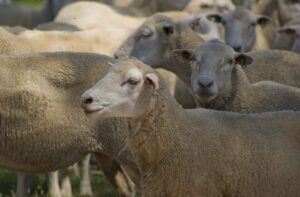
Sheep herding is crucial because it provides jobs for people in Nigeria. Employers are necessary for sheep farmers to assist in raising and providing for the livestock. Additionally, shearing companies require employees to shear the fleece from the sheep. Finally, Nigeria has a market for the sale of live sheep and lamb flesh. Due to these reasons, Nigeria’s economy heavily depends on the sheep industry.
How to begin a sheep herding enterprise in Nigeria
Select the appropriate sheep type: There are numerous varieties, and each has benefits and drawbacks. Find the breed that is ideal for your climate and pasture conditions by doing some study.
Build shelter: Sheep require covering from the sun, breeze, and precipitation. A straightforward three-sided shed will do, but make sure it is big enough for your sheep to sit comfortably inside.
Fence in your pasture: For the safety and confinement of your livestock, a strong fence is necessary. If at all feasible, install a wire fence with an electric charger along the top to deter intruder attempts.
Establish a business strategy: For any business, particularly one as complex as farming, this is a crucial step. Your company plan should outline your financial objectives as well as your target market, production schedule, and marketing tactics.
Purchase healthy animals: When buying sheep, make sure the breeder is respected and able to provide animal health certificates. Before buying, give the animals a thorough inspection to make sure they’re free of parasites or illness.
Provide proper nutrition: Maintaining the wellbeing of your sheep requires a balanced diet. Give your livestock a lot of fresh grass or hay, as well as a balanced mineral supplement.
Is Nigerian sheep herding successful?
In Nigeria, sheep herding can be successful. The price of wool, the demand for lamb meat, the cost of feed, housing, and labour are just a few of the things to consider when figuring out whether or not sheep farming is lucrative. Nigerian sheep farmers should concentrate on creating premium wool and meat in order to optimise profitability.
They should make an effort to keep their expenses cheap while still keeping their flocks healthy and productive. Sheep farming in Nigeria has the potential to be very profitable with the right administration. Sheep farming in Nigeria is done mainly for the production of meat.

Zero grazing sheep farming in Nigeria
In Nigeria, sheep are raised without pasture, which has many advantages. Environmental management made possible by zero grazing results in healthier livestock and higher output. The overgrazing of pastureland can also be avoided by zero grazing. Several distinct techniques can be used in Nigeria to raise sheep on zero grazing. The use of a movable pen system, where pens are routinely relocated to new pasture, is one typical technique.
It can be used in conjunction with other livestock, such as goats and cattle, and it takes less work than conventional methods of caring for sheep. The practise of rearing healthy sheep without grazing is known as zero-grazing sheep farming in Nigeria, and it offers a number of advantages.
Sheep varieties that are profitable to raise in Nigeria
The Uda, Balami, Red Sokoto, Yankasa, and West African dwarf breeds are the four most popular sheep types in Nigerian sheep farming.
1. In Nigeria, the Red Sokoto sheep variety is the most well-liked and lucrative one.A meat sheep suitable for Nigeria’s hot, dry environment is the Red Sokoto. The Red Sokoto breed provides premium meat that sells for a fair price in the market.
2. Another well-liked and lucrative sheep variety in Nigeria is the South African Dorper. The Dorper sheep is a dual-use animal that can produce both fleece and meat. High-quality wool from The Dorper is prized by Nigerian textile makers.
3.The third most common and lucrative sheep variety in Nigeria is the British Milk Sheep. Large amounts of milk are produced by the British Milk Sheep, a dairy animal. The British Milk Sheep’s milk is high in protein and butterfat, making it perfect for producing cheese and other dairy products.
4. A sizable sheep variety called the Blackhead Persian is distinguished by its black head and neck. They are very resilient creatures that can survive in challenging circumstances.
5. Sheep from South Africa called Dorpers have gained a lot of popularity in Nigeria. They are recognisable by their black faces and white frames. Dorpers can survive in both hot and cold regions due to their high adaptability.
6. A sheep breed from Kenya known as the Red Maasai is distinguished by its crimson coat. They are tough creatures that can live in dry environments.
7.The Australian Merino sheep breed is yet another well-liked and lucrative sheep type in Nigeria. Merino sheep are prized by Nigerian textile producers for their superior wool.
Where is sheep farmed in Nigeria?
In Nigeria, the northern regions have the greatest concentration of sheep, with Sokoto State having the most. Kebbi, Zamfara, Katsina, Kaduna, and Niger are other regions with sizable sheep populations.
Sheep nutrition and feeding management in Nigeria
1. Sheep are herbivorous animals who favour a meal full of greenery. Providing your sheep with at least 1 hectare of browse for every 100 animals is a reasonable rule of thumb.
2. A source of clean water for sheep to consume is also necessary. An accessible water source for the sheep is a water trough or basin put in a shaded area.
3. The time of year and the breeds that are readily accessible in your area will determine the kind of feed that you give your sheep. Your sheep will thrive on a diet of grasses and legumes during the wet season, when natural pasture is plentiful. You might need to add hay or publicly available feed to your sheep’s nutrition during the dry season when pasture is limited.

Sheep house design and fencing importance in Nigeria
The success of any sheep farming enterprise depends heavily on the layout of the sheep home and the value of fencing in Nigeria. Nigeria has a hot, dry environment, and there may be periods of extreme drought. As a result, the sheep’s home needs to be built to shield the livestock from the heat and sunlight. The roof should be constructed of a heat-reflecting substance, such as white-painted metal or aluminium.
To block the sun and breeze, the walls must be thick. To promote effective drainage and air, the floor ought to be slatted. Another crucial component is the fencing around the livestock pen. It ought to be high enough to keep predators out while remaining low enough for the livestock to be able to see out. In order for the sheep to be unable to leap over the fence, it should also be low enough to the ground.
Sheep health management in Nigeria
Nigeria’s hot and humid climate makes managing sheep health vitally essential. In Nigeria, illnesses like sheep pox, foot rot, and scab are widespread and can rapidly kill a sheep if not treated. Nigerian farmers must look after their livestock well to avoid diseases. This entails offering safe drinking water, green pastures, and cover from the heat and rain.
Regular sickness checks on sheep are important, and sick animals should be treated right away. Sheep will grow well and produce high-quality wool when their health is properly managed, which also helps to avoid diseases. Your sheep will remain healthy and productive with a balanced diet, lots of activity, and routine vaccinations.
Sheep farming types in Nigeria
sheep herding on a large scale: Large landmasses are used to raise sheep, frequently in semi-arid areas. With only sporadic assistance from farmers, the animals are largely allowed to fend for themselves.
Sheep herding on a large scale: This type of sheep farming is more intensive, involving the care and concern of the animals in more intimate quarters. In addition to conducting routine health inspections, farmers can supply additional feed and water.
Read More: Key Rules to Improve Feed Conversion Ratio (FCR) in Sheep: For Profitable Sheep Farming
Factors influencing Nigeria’s sheep farming profits
1.Making a profit is crucial to operating a profitable sheep farm. If farmers in Nigeria take the time to learn about the best methods for breeding and marketing their sheep, they can engage in sheep farming that is quite lucrative.
2. To increase their odds of success, Nigerians who want to start sheep farming must bear a few important considerations in mind. First and foremost, picking a suitable spot for your farm is crucial. You’ll need access to a lot of lands because sheep need a lot of grazing room.
3. You must put together a budget and business strategy for your farm. This will assist you in deciding how many sheep you need to buy, the type of shelter and fencing you require, as well as any additional expenses. If you don’t intend to do all the job yourself, be sure to account for the cost of hiring workers.
4. Loans for sheep farming are available from a number of financial organisations in Nigeria. Depending on the institution, the terms and conditions of these loans vary, but they usually have high interest rates and require collateral.
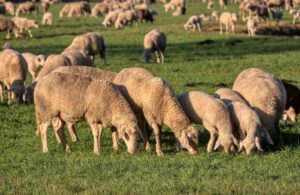
Loans for Nigerian sheep farmers
Last but not least, there are a number of government programmes and initiatives in Nigeria that are meant to aid in the growth of livestock companies, including sheep farming. Credit, technical support, and market information are all made available through these initiatives. For inputs like feed and vaccines, they also provide assistance.In Nigeria, a few of the loans most frequently used for sheep herding are:
The Nigerian Farm Development Bank (ADB)
Sheep farming is one of the agricultural endeavours for which the ADB provides financing. The ADB usually offers loans with flexible repayment terms and comparatively low interest rates.
The Nigerian Central Bank (CBN)
Through a number of initiatives, including the Agricultural Credit Guarantee Scheme, the CBN offers loans to farmers (ACGS). Up to 100 million naira ($280,00) in ACGS loans are offered with an annual interest rate of 9%.
Agricultural development is overseen by the federal ministry of agriculture (FMARD)
Through its Livestock Production Loan Scheme, the FMARD offers funding for the production of livestock (LPLS). At an interest rate of about 5% annually, LPLS loans are offered for up to 5 million naira (roughly $14,000).
Nigeria’s issues with sheep herding
Disease :Sheep can contract a number of ailments, such as scab, foot infection, and sheeppox. These ailments have the potential to be fatal for animals and create serious health issues.
Predators: In Nigeria, sheep producers may experience difficulties due to predators like lions, leopards, and hyenas. These animals have the ability to infect people and can kill sheep for sustenance.
water shortage: Fresh water is essential for the wellbeing of sheep. Dehydration and even death can occur if there isn’t enough water accessible.
Poor quality pasture: Poor pasture conditions could prevent livestock from receiving the necessary nutrition, which could result in health issues.
Drought : In Nigeria, drought is a significant issue that can destroy the sheep farming industry. The death of the grass can result from drought, leaving the sheep without sustenance.
Death and hunger may result from this.
How much money is needed to begin a sheep property in Nigeria?
The money needed to launch a sheep farming enterprise ought to cover the cost of the land and housing, the sheep, the feed, the feeding apparatus, etc. In Nigeria, establishing a sheep farm typically costs between N60,000 and N70,000. This includes the price of purchasing a flock of high-quality sheep as well as the price of building the required infrastructure, such as fencing. Another crucial aspect to take into account is the expense of feeding and caring for the sheep. This includes the price of purchasing strong, high-quality breeding stock, which is crucial for running a profitable farm.
Feed, fencing, housing, and medical expenses are additional expenditures. Sheep farming can be profitable, despite the significant initial expenditure. The price of purchasing, feeding, housing, and other related expenses must be taken into account when determining the cost of sheep farming in Nigeria. You’ll also need to account for your own work expenses and time. You need to offer your lambs or wool at market rates in order to figure out how much money you’ll make from sheep farming in Nigeria.
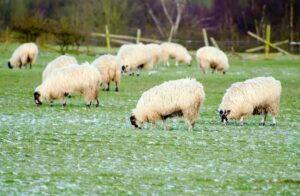
Sheep marketing in Nigeria
1.When selling sheep in Nigeria, there are a number of things to keep in mind. The intended market is the most crucial element. Wool and meat from sheep are sold in a variety of marketplaces, each with their own specifications.
2. When marketing sheep, it’s crucial to take the transportation system into account. There are many various ways to get around Nigeria, but they can be expensive and unreliable. It’s crucial to have a strategy in place for quickly and effectively bringing the sheep to market.
3. Last but not least, it’s critical to comprehend the Nigerian regulation landscape. Sheep farming and marketing are subject to a number of rules and regulations in Nigeria. It’s critical to be knowledgeable about these laws and rules to prevent possible issues.
Read More: How to Start Sheep Farming in Mexico: Requirements, Business Plan, Setup Cost, Subsidy, and Loans
Conclusion
If producers in Nigeria take the time to educate themselves about the industry and the market, they can make money from raising sheep. The demand for meat and wool products is rising in Nigeria as the country’s sheep business expands quickly. Nigeria has a lengthy history of raising sheep, and there is a significant market for meat and wool goods. The sheep must be fed and given water in the final stage.
